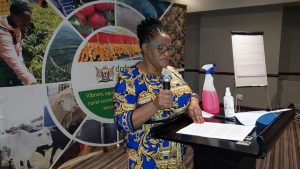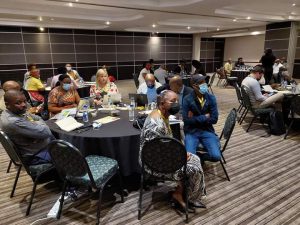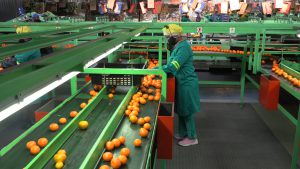
by Olwetu Batyi | Apr 7, 2022 | Uncategorized

DRDAR MEC vows to ensure efficient services
MEC for Rural Development and Agrarian Reform (DRDAR) Nonkqubela Pieters has vowed that no money will be left unspent as the Department works towards delivering excellent services to the people of the province.
The MEC was addressing stakeholders including farmers, commodity groups during a Post Policy Speech Stakeholder Engagement held after the tabling of the policy speech.
“I want to ensure you that all the pronouncements will be implemented. We are going to ensure that with every cent spent there’s an impact in terms of economic growth and employment. We will do what we said we will do,” she said.

MEC Pieters said the engagement was meant to debate robustly, be able to identify areas where a great work was performed and where things were not do well. She said It was the responsibility of all stakeholders to come up with clear recommendations on how to improve in areas where the department did not do well.
Head of Department Siphokazi Ndudane said: “I’d like to stress our commitment to continue to move with speed and achieve our plans. Agriculture is in the centre of rural wealth and economic development. We need to transform rural growth and employment and ensure that people have access to food.”
Ndudane vowed to end corruption and self-empowerment by ensuring resources of government are used for the benefit of the people.
“We’ve been hearing about the potential we have as the province but we need to graduate from that by using that potential to change the lives of the people, said Ndudane.
Speaking on behalf of workers, trade unionist Thembakazi Xoxo said officials will continue to serve the people to the best of their ability.
“We’ll be consistent and serve with excellence,” she added.
Some of the issues raised by the farmers included access to land and funding, frequent engagement with DRDAR management, research, training, infrastructure development and need for an Indaba.
MEC Pieters said the issues raised by farmers did not need “brilliant responses but farmers need implementation and that what we will do.”
She said she would convene an Indaba that would also include potential investors.
by Olwetu Batyi | Mar 2, 2022 | Uncategorized
Varsity student uses monthly allowance to start agri business
A young Dutywa animal science student from the University of Fort Hare has used his monthly R1, 500 student aid allowance to start an agriculture business in his home town. Nkosinathi Makamela launched his venture in 2020 at the height of the Covid-19 pandemic when the country was still on a hard lockdown, and has already established a market for his business.
With plans to become a commercial farmer in the next five years if all goes well, Makamela has established a piggery and vegetable farm on 3ha of land in his rural vill age. Here he plants cabbage, carrots, beetroot, green peppers and spinach, which he sells to fruit and vegetable stores in Dutywa and neighbouring towns.
He said all he needed was an investment from the public and private sector to realise his dream of being a commercial farmer. The department of rural development and agrarian reform has played its part by supplying Makamela with seedlings.
“The company will greatly enhance the well-being of the community at large through the provision of nutritious food, creation of jobs and education and training. As we plan to provide learnerships and training programmes for the youth,” he said.
Makamela, who also owns a hawkers’ stand in Dutywa’s central business district where he sells vegetables, aims to increase bulk supply to shops and individuals who buy in bulk, such as street venders. The 22-year-old farmer describes himself as a team player and a focused and hardworking individual who pays very serious attention to his work.

by Olwetu Batyi | Mar 2, 2022 | Uncategorized

Deciduous fruit farmers anticipate better yields
Deciduous fruit farmers in the Sarah Baartman District who have had to endure souring fortunes as a result of natural disasters in the past three financial years are anticipating a much-needed turnaround.
After suffering a prolonged drought since 2015, their situation worsened when a severe hailstorm ravaged their orchards of apples, pears and plums in 2021, destroying 80% of the fruits just before harvesting season. Misgund Landgoed just outside Joubertina is one of the farms hit hard by the punishing weather, leading to a decline in the farm’s yield that fluctuated just between 2,000 and 3,000 tonnes from its 69 hectares of orchards.
The farm grows different kinds of apples, namely Flash Gala, Royal Gala, Top Red, Grannysmith and Golden Delicious, as well as plums and Forelle pears. Misgund Landgoed is owned by a 134-member trust and it is among the many enterprises to have received support from the Eastern Cape provincial department of Rural Development and Agrarian Reform ( DRDAR ) .
“Government extended muchneeded support to the farm,” said Jan Uithaler, deputy chairperson of the board of trustees. “When we struggled with water during the severe drought in the region, the department helped us with a proper irrigation system — some – thing which saw our production growing exponentially.
DRDAR further supported the farm with a tractor and a 1,500 litre boom sprayer,” Uithaler said all the help they received propelled them even further but they suffered severely after the hailstorm. However, they expect their yield from the February harvest to go beyond 3,000 tonnes.
“Our fruit is in perfect condition. We ’ve had enough water. There we re n’t gusting winds that usually blow our fruit off the trees and at times causing them bruises when they thrust on either the stems or bump on each other.
“This year’s yield is definitely going to make a huge difference to our bottom line and help us to service our debts.” Wilfred Malgas, who manages JD Rovon farm which also grows deciduous fruit, projects an increase on their bottom line of just more than R 5 – million.
“The farm has always relied on government grants and other forms of aid but if what we see on our orchards can be a constant trend for at least 10 years, we’d certainly be a sustainable business and be able to pay everything from our own pocket s,” Malgas said.
DRDAR provided the farm fertilisers, a tractor, irrigation system and pesticides and scooped the farm’s dam, its only water source for irrigation. It also subsidised the business with 4,000 litres of fuel per year.
A large portion of the two farms’ produce is exported to international markets like Angola, China, the US and Britain. The business employs more than 200 workers from neighbouring communities with most of the labour force being seasonal workers during the harvesting season.

by Olwetu Batyi | Mar 1, 2022 | Uncategorized

Godongwana’s budget restores hope for vulnerable households
National Treasury has tabled a basket of proposals aimed at supporting poor and vulnerable households, while staying on course to restore the health of the public p u r se. This comes at the back of tax collections over the past 12 months exceeding expectations due to the strength of the mining sector revenue, and an upturn in earnings following the 2020 recession.
“The 2022 Budget extends government’s support to poor and vulnerable South Africans, while staying on course to restore the health of the public finances. This approach is supported by economic reforms to bolster investment, growth and employment,” said Treasury.
The department said the budget responds to the immediate needs of low-income households by providing short-term assistance. However, Treasury cautioned that uprooting poverty and inequality requires a thorough restructuring of the economy, and creating an environment in which the private sector can invest and create jobs.
“Despite an uneven economic recovery, tax collections over the past 12 months have outperformed expectations due to the strength of mining sector revenue and an upturn in earnings following the 2020 recession.
“Some of this improved performance is projected to continue over the medium term. “Government is using a portion of the additional revenue to accelerate debt stabilisation, with the majority targeted to address urgent social needs, promote job creation through the presidential employment initiative, and support the public health sector.
” Spending expected to grow over the medium-term National Treasury said over the next three years, consolidated government spending was expected to grow at an annual average of 3.2%, from R2.08-trillion in 2021- 22 to R2.28-trillion in 2024-25.
“Most non-interest spending is directed to the social wage, which includes health, education, housing, social protection, employment programmes and local amenities. An amount of R18.4bn is allocated in 2022-23 and 2023-24 to support youth employment and the creation of short-term jobs under the presidential employment initiative, Treasury said.
“Government’s steadfast commitment to returning public finances to a sustainable position means that it will achieve a primary surplus – where revenue is higher than non-interest spending – by 2023-24, one year earlier than anticipated at the time of the 2021 MTBP S.
“This will bring the period of fiscal consolidation to a close, creating space to reconsider the funding of South Africa’s priorities in a fiscally

by Olwetu Batyi | Mar 1, 2022 | Uncategorized

Government will soon launch a new business bounce-back scheme aimed at supporting businesses in distress owing to the Covid-19 pandemic, finance minister Enoch Godongwana has announced. Making the announcement while delivering the 2022 Budget Speech on Wednesday, the minister said the scheme would use two mechanisms that would be introduced sequentially. First, small business loan guarantees of R15bn would be facilitated through participating banks and development finance institutions.
“This allows access for qualifying non-bank small and medium loan providers. Government will partner with loan providers by underwriting the first 20% of losses for banks and other eligible small and medium loan providers.
“The eligibility criteria, including the requirement for collateral, has been loosened. This mechanism will be launched and be operational next month.” Second, by April this year, government intends to introduce a business equity-linked loan guarantee support mechanism.
“We intend to bring the total support package through the bounceback scheme to R20bn. The equity support mechanism of this scheme will be facilitated through DFIs [development finance institutions]. It will also be available to qualifying non-bank small and medium finance providers,” Godongwana said.
A Budget Review document accompanying the speech reveals that government will, over the next three years, spend R721bn to promote faster and sustained inclusive economic growth to address unemployment, poverty and inequality plaguing the country. In the 2022 Budget Review, the Treasury said over the Medium Term Expenditure Framework (MTEF), expenditure would in this regard increase at an average annual rate of 8.5%, from R201bn in 2021/2022 to R256.8bn in 2024/2025.
The document states that over the medium term, the department of small business development would promote youth entrepreneurship by supporting at least 15,000 youth-owned enterprises.
“It will also reintroduce the Youth Challenge Fund at an estimated cost of R91.3m, harnessing creative solutions to address youth unemployment,”
The document reads. Noting that access to finance, particularly for the early stages of business development, is crucial to sustain small businesses, The Treasury said it would continue rolling out the Township and Rural Entrepreneurship Fund, implemented through the Small Enterprise Finance Agency, at an estimated cost of R2.9bn. Department allocations The Treasury said the government had allocated R1.3bn to the Agricultural Production, Biosecurity and Resources Management Programme in the department of agriculture, land reform & rural development for inspection, quarantine and biosecurity.
The Budget Review states that among other things, the allocation will also be used to strengthen the biosecurity, sanitary and phytosanitary standard required by international markets.
“To ensure sustainable development and social justice, R14.6bn is allocated for land reform and restitution, and R6.8bn is allocated for blended finance programmes, farmer development and post-settlement support initiatives.”
The department of science and innovation is allocated R28bn over the MTEF period. In this regard, priorities will include implementing the 2021-2031 plan on science, technology and innovation —which is expected to support mining, manufacturing and agricultural innovation, and supporting the National Research Foundation.
The Treasury allocated R360m to the department of tourism for it to focus on supporting recovery in the tourism sector through the pilot phase of the Tourism Equity Fund introduced in 2021. A further R240m is allocated to enhance tourism assets and infrastructure, with R80m being reprioritised to support short-term jobs in tourism.
The department of forestry, fisheries & the environment has reprioritised R244m over the MTEF period to improve institutional capacity and modernise meteorological services at the South African Weather Service. “A total of R17.8bn is allocated over the next three years to support business investment in new equipment and infrastructure through incentive programmes such as the automotive investment,” reads the document. —

by Olwetu Batyi | Mar 1, 2022 | Uncategorized

New SA-China citrus protocol to benefit East Cape farmers
Citrus farmers in the Eastern Cape are set to benefit from the new citrus protocol signed between SA and China. The old protocol had more stringent regulations on cold requirements for lemons, previously at 0.6°C or below.
The new protocol allows for 3°C for storage spanning a maximum of 18 days. The new protocol with China was brokered by agriculture; land reform and rural development minister Thoko Didiza. Together with Eastern Cape rural development and agrarian reform (DRDAR) MEC Nonkqubela Pieters, Didiza witnessed the first shipment of lemons to China from the Durban harbour.
The Eastern Cape, which is SA’s biggest lemon producer, will export its produce under the new protocol. The province produces 42% of SA’s total production. Of the 30-million cartons of lemons that SA exported in 2021, 11.3-million came from the Eastern Cape.
It is estimated that lemon exports to China will generate an additional R325-million and create 800 new jobs in the country. Black farmers are also participating in the export market, with a 40% increase in volume to 1.6m carton exports in 2020. During his state of the province address Eastern Cape Premier Lubabalo Oscar Mabuyane said:
“Our province is an exporter of agricultural commodities to international markets. Today lemons produced from our province were shipped to China at the Durban port. While we celebrate this milestone, we want the produce from our farmers to be shipped from our ports and we are engaging Transnet regarding improvements at the East London port.”
The industry is also a significant job creator, employing some 120,000 people nationally. Some 26,000 of those are on Eastern Cape farms and pack houses. The Sundays River Local municipality contributes more than 4,000 jobs alone.
During picking and packing season, that number grows by 8,000. The DRDAR is assisting farmers with lemon orchard development while also working towards improving access to water, logistics, production inputs, infrastructure and new markets through compliance and accreditation programmes.











